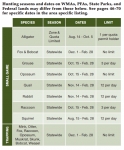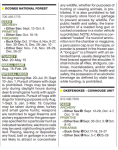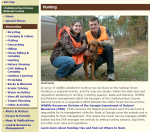GAEngineer
Member
**EDIT** See my second post in this thread. GA Code explicitly states it is lawful to trap beaver year round.
**EDIT 2** For clarification, there are still restrictions on WMAs and there may be restrictions on some National Forests. My inquiry and investigation was limited to the NF that I frequent. Do your due diligence and check for special regulations on your area of interest.
The published regulations on the topic of trapping beaver and coyote on public land seem pretty straight forward - but remembering the unsatisfactory "conclusions" of the threads linked below I decided to contact the local DNR Game Management Office. Prior to calling I gathered my thoughts based on my reading of the available documents - laid out below for your review.
My starting position on laws and regulations is that if it is not addressed or explicitly forbidden then it is allowed - but we don't have to have that conversation as it is stated in the very first line of the trapping regulations that “There is no closed season for trapping of beaver or coyote in this state.”
The first lady I spoke to at DNR was adamant that I could not trap on public land unless there was a hunting season open - I walked her through my thought process and the documents referenced below and she ended up handed me off to another gentlemen in the office. He was also at first adamant that no animal may be taken from public land unless there was an open hunting season - again through my thought process with him. He did not disagree that trapping is not hunting and the trapping regulations say there is no closed season for trapping beaver - however he stated he was certain no animal can be taken from public land outside of an open hunting season. We ended the call there - he is going to do some research and find the regulation he is recalling and give me a call back. I'll post an update when I get his response.
Here's where I am at until provided conclusive evidence otherwise: If there is no closed season for trapping beaver/coyote in the state than the inverse is true - the season for trapping beaver/coyote in the state is open all year.
I suppose it is worth discussing that the special regulations on nearly all the federal lands state that it is prohibited to "Place, leave, or deposit any food, bait or garbage in a manner likely to attract or concentrate any wildlife, whether for the purposes of hunting or viewing animals." If this is meant to encompass trapping then it is prohibited to use any bait or lure for any trapping on federal land regardless of the season or target species. If this is not meant to include trapping then there are no trapping restrictions on federal land beyond the DNR regulations.
References:
**EDIT 2** For clarification, there are still restrictions on WMAs and there may be restrictions on some National Forests. My inquiry and investigation was limited to the NF that I frequent. Do your due diligence and check for special regulations on your area of interest.
The published regulations on the topic of trapping beaver and coyote on public land seem pretty straight forward - but remembering the unsatisfactory "conclusions" of the threads linked below I decided to contact the local DNR Game Management Office. Prior to calling I gathered my thoughts based on my reading of the available documents - laid out below for your review.
My starting position on laws and regulations is that if it is not addressed or explicitly forbidden then it is allowed - but we don't have to have that conversation as it is stated in the very first line of the trapping regulations that “There is no closed season for trapping of beaver or coyote in this state.”
The first lady I spoke to at DNR was adamant that I could not trap on public land unless there was a hunting season open - I walked her through my thought process and the documents referenced below and she ended up handed me off to another gentlemen in the office. He was also at first adamant that no animal may be taken from public land unless there was an open hunting season - again through my thought process with him. He did not disagree that trapping is not hunting and the trapping regulations say there is no closed season for trapping beaver - however he stated he was certain no animal can be taken from public land outside of an open hunting season. We ended the call there - he is going to do some research and find the regulation he is recalling and give me a call back. I'll post an update when I get his response.
Here's where I am at until provided conclusive evidence otherwise: If there is no closed season for trapping beaver/coyote in the state than the inverse is true - the season for trapping beaver/coyote in the state is open all year.
I suppose it is worth discussing that the special regulations on nearly all the federal lands state that it is prohibited to "Place, leave, or deposit any food, bait or garbage in a manner likely to attract or concentrate any wildlife, whether for the purposes of hunting or viewing animals." If this is meant to encompass trapping then it is prohibited to use any bait or lure for any trapping on federal land regardless of the season or target species. If this is not meant to include trapping then there are no trapping restrictions on federal land beyond the DNR regulations.
- Starting with the current published hunting regulations the first mention of trapping is on page 33:
- Page 35:
- Page 43:
- Page 68 & 69:
- Just to be sure I checked the Forest Service web page for this forest.
- On to the trapping regulations referenced on page 33 of the published hunting regulations
References:
Last edited:




